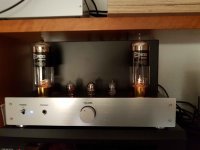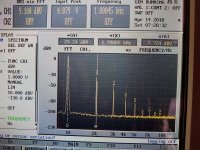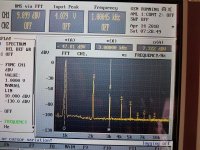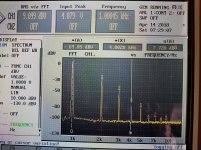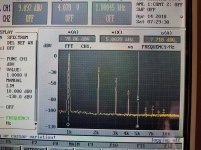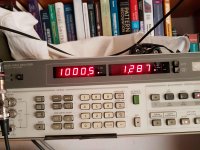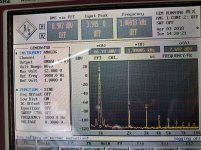Hello guys. I am new here (tube thread) and I would like ask one question. I own one elekit amp with 300b tube. I like a lot how sound with my full range drivers. With complex music is superb. Instruments separation really is spectacular. Cons: little output power, but my room is small, so with this 4 watts (more or less) is enough for my tastes.
Well, I have some very nice measure instruments (some borrowed) to measure amps, and I have done it with this tube amp. Before tubes I built a lot of solid state amps (some with vfets) from Pass thread. There, measures are important, our obsessions were perform a lot of measures, try reach the same performances that Nelson with his amplifiers..
But now, with tube amps I found that measures are something not very important. Before this elekit amp I built one nice tubelab with very old opt by curiosity. Measures in this little amp were really bad. But a friend from forum told me that I must hear it before dismount it.. What shock!!... Sound incredible. Why???
So, later I purchased the elekit tu8600, and later a lot of tube rolling I found my tube set for this amp (12au7 rca clear top, e83cc tesla and EML or ELROG 300b). Spectacular, superb,...
Well, now I perform the measures of harmonic pattern. What surprise!!
The harmonic pattern is, by far, a lot worse than solid state. But the sound a lot better. Look the images, and the total amount distortion at 1W rms and 8 ohm : 1.3%.
Can somebody tell me why this harmonic pattern is so good to my ears???
Measures are something useful or fireworks???
I do not believe in magic, but if objetive measures are no telling us how good is an amp, what is???
I asked this question in elekit thread but nobody reply me, so I am here...
Thanks in advance..
Best
Well, I have some very nice measure instruments (some borrowed) to measure amps, and I have done it with this tube amp. Before tubes I built a lot of solid state amps (some with vfets) from Pass thread. There, measures are important, our obsessions were perform a lot of measures, try reach the same performances that Nelson with his amplifiers..
But now, with tube amps I found that measures are something not very important. Before this elekit amp I built one nice tubelab with very old opt by curiosity. Measures in this little amp were really bad. But a friend from forum told me that I must hear it before dismount it.. What shock!!... Sound incredible. Why???
So, later I purchased the elekit tu8600, and later a lot of tube rolling I found my tube set for this amp (12au7 rca clear top, e83cc tesla and EML or ELROG 300b). Spectacular, superb,...
Well, now I perform the measures of harmonic pattern. What surprise!!
The harmonic pattern is, by far, a lot worse than solid state. But the sound a lot better. Look the images, and the total amount distortion at 1W rms and 8 ohm : 1.3%.
Can somebody tell me why this harmonic pattern is so good to my ears???
Measures are something useful or fireworks???
I do not believe in magic, but if objetive measures are no telling us how good is an amp, what is???
I asked this question in elekit thread but nobody reply me, so I am here...
Thanks in advance..
Best
Attachments
The 1st thing I notice there are the smoothly tapering off harmonic sequences.
So obviously not a linear response, but rather a smoothly "curved" response (FFT of a low-power law distortion). Apparently the ear is still happy with this. Maybe you have straightened out the cone support tension curve of the speaker?
So obviously not a linear response, but rather a smoothly "curved" response (FFT of a low-power law distortion). Apparently the ear is still happy with this. Maybe you have straightened out the cone support tension curve of the speaker?
Last edited:
Tube amps do generally end up with smooth tapering harmonic sequences if designed "well". But then "well" could just be what sounds good to the designer using his speakers. A rather circular design rule.
Have you tried reversing the wire connections to the speaker(s)? But then, maybe speakers have the same (symmetrical odd harmonic at least) suspension distortions, so that would not make much difference. (except for the even order distortions, which seem to sound OK at low % anyway)
Have you tried reversing the wire connections to the speaker(s)? But then, maybe speakers have the same (symmetrical odd harmonic at least) suspension distortions, so that would not make much difference. (except for the even order distortions, which seem to sound OK at low % anyway)
Last edited:
Measurements are still very useful for tube amps, even SET amps. You'll generally want to look at how low you can go at full power for 5% and 10% THD.
You can put some feedback around the amp and listen to it without most of the THD. You would likely find that the feedback isn't helpful to your ears, but very helpful to your FFT.
You can put some feedback around the amp and listen to it without most of the THD. You would likely find that the feedback isn't helpful to your ears, but very helpful to your FFT.
Is there a false premise in this question?Can somebody tell me why this harmonic pattern is so good to my ears???
Why?
Why?. I do not understand why this harmonic pattern sound so good when I have seen a lot better harmonics pattern in a others amps, and the final sound is worse, for my taste.
For example, I own an original J2 from Nelson. I have measure the same. Look image. This is the original J2 (best amplifier of 2017, Stereophile). For me, sound is not as good as tube amp. All music is more transparent, more details and instruments separation with elekit. J2 is an incredible amp (is my second amp), but I feel 'more' hearing with 300b.. And this is the problem, why?. Measures are better with J2, harmonics are a lot lower in value...
Why?. I do not understand why this harmonic pattern sound so good when I have seen a lot better harmonics pattern in a others amps, and the final sound is worse, for my taste.
For example, I own an original J2 from Nelson. I have measure the same. Look image. This is the original J2 (best amplifier of 2017, Stereophile). For me, sound is not as good as tube amp. All music is more transparent, more details and instruments separation with elekit. J2 is an incredible amp (is my second amp), but I feel 'more' hearing with 300b.. And this is the problem, why?. Measures are better with J2, harmonics are a lot lower in value...
Attachments
There are some questions not answered with normal rules of thinking, there are more elements in play that we can not precise yet. have your read the article Do your ears deceive you_.pdf - Google Drive
Jama, you are an electrical engineer. You are questioning why your observation of harmonic distortion does not correlate with your observation of the sound quality. This is truth.
Now you have to think very very hard about the possible reasons for this.
Thinking is highly limited by making assumptions.
Avoid inheriting assumptions that will lead you to the same bad conclusions as other people.
Now you have to think very very hard about the possible reasons for this.
Thinking is highly limited by making assumptions.
Avoid inheriting assumptions that will lead you to the same bad conclusions as other people.
It has been known for around 60 years that some people prefer sound with a little low order distortion added. This is probably because low order distortion adds sounds which are harmonically related to the original sound (and so musically acceptable), and the accompanying intermodulation (which is not harmonically related) may be at a sufficiently low level not to create a problem.
Then this article can be a solution to the mistery... I have read it and really is fascinating and amazing. And following scientific method...
Do your ears deceive you_.pdf - Google Drive
So, our ears are the key factor in the equation...
Do your ears deceive you_.pdf - Google Drive
So, our ears are the key factor in the equation...
One of my tube amplifiers has a single ended ultralinear 6L6 as output stage with two identical 6SN7 triode stages as voltage amplification. No global feedback, output transformers not of the best quality, very high harmonic distortion, to the point that I would not even call it a true "Hi-Fi" amplifier, its more like a guitar amplifier. When I play certain recordings of string instruments, I distinctly like it more than other amplifiers. I guess that the added distortion is blending with the recorded harmonics to create a sound that I subjectively like more than the faithful reproduction. It may be that the sound engineer made a bad choice at the recording studio and the amplifier is adding artificial harmonics to replace the real ones lost in the recording, or that my personal idea of this instrument sound is flawed by the way I hear it at live events. The confirmation that the measures are telling the truth and my preference for this amplifier is purely subjective, the same amplifier does reproduce badly other instruments such as the lower registers of the organ. When I hear an amplifier or speaker that consistently sounds well, irrespective of the kind of music, there is a strong correlation with good electrical measures.
Well, then the problem has not easy solution. If our ears has a lot of imperfections (some days I feel all audio chain sound very bad, and others the opposite), adding recordings done irregularly, what must be our criterion to select our audio chain?. Use differents amps, one for each day, or state of mind?. I think this is psycho-acoustic and this is far away of my knowledge. As you say, if measure well, then probably will sound well (but in my case, elekit tu8600, with all its imperfections, sound great for my ears and J2 too, of course)
Inheriting assumptions leads to...
1. If the measurement doesn't correlate with the sound, the measurement is ok and my auditory system is faulty or inconsistent.
2. If the measurement is worse when the sound is better then my auditory system favours less accurate sound.
These conclusions are utter bollocks but keep turning up like bad pennies.
1. If the measurement doesn't correlate with the sound, the measurement is ok and my auditory system is faulty or inconsistent.
2. If the measurement is worse when the sound is better then my auditory system favours less accurate sound.
These conclusions are utter bollocks but keep turning up like bad pennies.
- Status
- This old topic is closed. If you want to reopen this topic, contact a moderator using the "Report Post" button.
- Home
- Amplifiers
- Tubes / Valves
- Intriguing measures on tube amp
